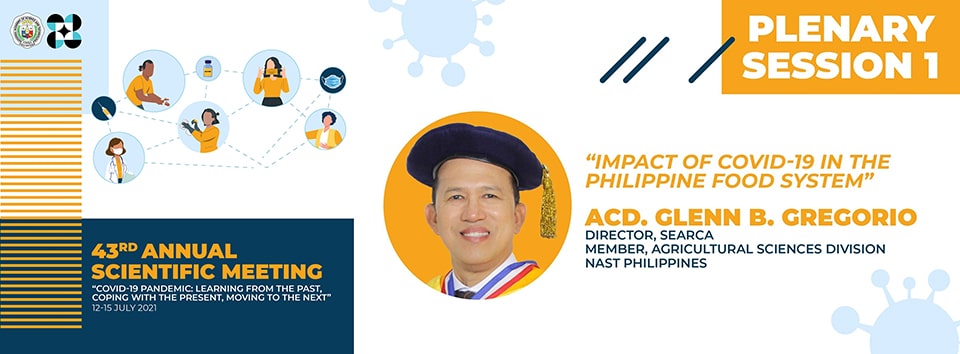
Dr. Glenn B. Gregorio, Southeast Asian Regional Center for Graduate Study and Research in Agriculture (SEARCA) Director and National Academy of Science and Technology, Philippines (NAST PHL) Academician, shared the impacts of COVID-19 in the Philippine food system and ways to move forward in the First Plenary Session on Food, Environment, and Health of the 43rd Annual Scientific Meeting (ASM) organized by NAST PHL on 12-15 July 2021.
An attached agency to the Philippine Department of Science and Technology (DOST), the Academy launches ASM as an annual activity to serve as the leading forum for the presentation of scientific and policy research in the Philippines. It aims to submit policy recommendations to the Philippine government and the private sector for appropriate courses of action.
The theme of the 43rd ASM, "COVID-19 Pandemic: Learning from the Past, Coping with the Present, Moving to the Next." It comprises six plenary sessions on the following: (1) Food, Environment, and Health: Exploring the Connections; (2) Viral Evolution, Dynamics, and Modelling Interventions; (3) Systems Approaches to Address Present-day Hazards; (4) Educating for Our Future: Retrieving the COVID-19 Generation; (5) Balancing the Economy and Health; and (6) Health Systems Response and Preparedness.
Acd. Rhodora V. Azanza, NAST PHL President, indicated that the Meeting would address existing gaps and problems in health care delivery and infrastructure.
"It has become imperative that we learn from these challenges, institute all the needed health reforms and improvement to make our health and social systems resilient and responsive to emergent and immerging health crisis," said Dr. Azanza.
Echoing Dr. Azanza's words, Dr. Gregorio started the ball rolling in the Plenary Session 1 with SEARCA's recently published paper entitled, "Assessing the Impact of the COVID-19 Pandemic on Agricultural Production in Southeast Asia: Toward Transformative Change in Agricultural Food Systems" at the Asian Journal for Agriculture and Development (AJAD) . He discussed in agriculture food systems create supply and demand shocks, affecting immediate and long-term economic performance and food security.
"Due to lockdown, mobility restrictions result to quantity reduction in farm labor, which if continues longer would translate to overall reduction in agriculture productivity," Dr. Gregorio elaborated.
Furthermore, he added that agricultural production reduction is also caused by farmers' limited access to farm inputs and access to markets to sell produce, which may result to profit losses and wastage of farm produce.
Sharing how SEARCA performs its mandate to alleviate poverty in the agriculture sector, Dr. Gregorio reinforced the Center's 11th Five-Year Plan of Accelerating Transformation Through Agricultural Innovation (ATTAIN).
"Clearly, there is a need for an accelerated transformation of the agriculture sector so it can be fully maximized for human well-being. SEARCA strongly believes that the systemic and integrated innovation here would require a new mindset where farming is viewed as a sustainable agribusiness," emphasized by the SEARCA Director.
He underscored that there is a need for more systematic identification of these critical food systems across the country and more directed integrative and systemic interventions to better respond to the ongoing and future pandemics.
"The Philippines must heavily invest on more integrative studies assessing risks and uncertainties related to price volatilities, inclement weather, and climate change-related hazards that characterize farm production systems," he said.
Among the investments pointed out by Dr. Gregorio were the following: (1) urgent support of more studies and activities related to improving design of financial technologies for farmers; (2) wider participation in these financial systems like loans and credit systems and agricultural insurance facilities, among others; and (3) policies to support institutional and organizational interventions but adaptive to the cultural and social condition of a group or community both at the national and local level.
The need to strengthen capacities of higher education institutions, particularly the state universities and colleges highlighting the need for food system innovations toward food security and sovereignty, resilience, and poverty reduction was also mentioned by the Academician.
Dr. Gregorio concluded his presentation by emphasizing the importance of synergy in societal roles toward future-proofing the Philippines as a cadre of budding scientists, researchers, and policymakers.
"We are all key players in our society's overall ability to achieve the aspired food security and economic development. But we can aspire to go beyond toward an economic development that is sustainable, inclusive, environment-friendly, and most importantly, resilient to current and future pandemics," Dr. Gregorio told the scientific community.